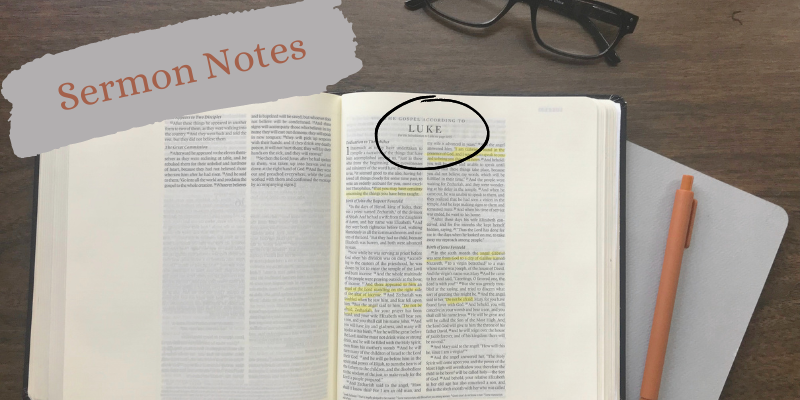
Our pastor started a new series on Sunday. We will be studying the gospel according to Luke for the next several months. As always, I’m excited about this new series. No doubt there will be new insights, new growth as our church studies together the life of Jesus as seen through Luke’s eyes. If you want to follow the sermon series, subscribe to our church’s YouTube channel. And, of course, you are welcome to check in here as I think about and meditate on what I learn each week. At the bottom of each post, I will keep a running list of links to posts about this sermon series.
Many people have set out to write accounts about the events that have been fulfilled among us. They used the eyewitness reports circulating among us from the early disciples. Having carefully investigated everything from the beginning, I also have decided to write an accurate account for you, most honorable Theophilus, so you can be certain of the truth of everything you were taught.
Luke 1:1-4 NLT
Your study Bible most likely has a great introduction to Luke. I’m not going to reiterate all of the introductory ideas here. Instead, I want to focus on five things about Luke’s gospel that set it apart from the other accounts.
First, Luke is the only New Testament author that is not Jewish. He was most likely Greek, a Gentile. His is the only gospel with a sequel, the book of Acts. And because Luke wrote both Luke and Acts, he contributed more than 25% of the New Testament.
Second, Luke was a contemporary of Paul’s, serving with him. From Colossians 4, we see that Luke was with Paul. Paul identifies Luke as a dear friend and doctor. Paul also mentions Luke in his letters to Philemon and Timothy. Since Luke spent so much time with Paul, he was uniquely qualified to write about Paul’s work in the book of Acts.
Third, Luke anchors his work in history by dating his writing based on the governing heads of state in Rome. He identifies himself as an investigator! He tells us four significant things about how he went about his writing. First, he investigated. Second, he went back to the beginning. Third, he was thorough, studying everything. Last, he was orderly, not necessarily meaning chronological order, but organizing his writing to be clear about Jesus’ ministry. Luke tells us of God’s work in history through Jesus!
As our pastor pointed out, a major concept is found in Chapter 1, verse 1 – “fulfilled!” Luke carefully recounts over and over how Jesus has fulfilled all the Old Testament promises. In fact, Luke quotes from as many as eight Old Testament books using some 30 references to the Old Testament. As Paul writes to the Corinthian church, “For all of God’s promises have been fulfilled in Christ with a resounding “Yes!” And through Christ, our “Amen” ascends to God for his glory.” (2 Corinthians 1:20 NLT) Luke’s gospel highlights this concept!
Fourth, Luke records two of the most famous parables – the Good Samaritan and the Prodigal Son. It’s interesting to me that there are only 4 parables told in all three synoptic gospels. Mark records only 1 unique parable – the “parable of the growing seed.” Matthew and Luke record most of the parables, eight of which are the same, and 12 – 13 different ones in each book.
Last, a key verse in Luke points to a major theme – the saving work of Christ. In fact, Luke reminds us that salvation is not just for the Jews, but for Gentiles as well. Luke shows us how Jesus deeply cared for everyone – especially the marginalized in society, the outcasts, the poor, the lost.
Jesus responded [to Zacchaeus], “Salvation has come to this home today, for this man has shown himself to be a true son of Abraham. For the Son of Man came to seek and save those who are lost.”
Luke 19:9-10 NLT
Luke is clear about his purpose in writing. He writes so that we might know – experiential knowing, through direct relationship – that what we have been taught is true. I hope you will join me in digging deep into the gospel according to Luke so that we can grow up in all things following the example, imitating our Savior!
Tell me the story of Jesus,
Fanny Crosby
write on my heart every word;
tell me the story most precious,
sweetest that ever was heard.
Comments (2)